Emil Berliner Studios Mines More Sonic Gold from the Deutsche Grammophon Back Catalogue: The Original Source Series Batch #4
Gundula Janowitz and Herbert von Karajan shine in a classic of the Gramophone, while Claudio Abbado and the Vienna Philharmonic sizzle in Tchaikovsky
Of all the many remarkable releases so far in Deutsche Grammophon’s groundbreaking audiophile vinyl reissue series, this was perhaps the most eagerly awaited installment for many classical-loving collectors. It definitely was for me.
Why? Because along with a certified classic of the DG catalogue (the Karajan/Janowitz Richard Strauss album), we are getting an early, distinguished Abbado outing in Tchaikovsky, plus the three legendary William Steinberg/Boston Symphony Orchestra records made for DG in the early 1970s. These are highly prized by collectors and with good reason. (Separate reviews of the Steinberg releases will follow in coming days).
All of these records are more than worthy of the full-on deluxe reissue treatment afforded by DG and the miracle workers at Emil Berliner Studios: Rainer Maillard and Sidney C. Meyer.
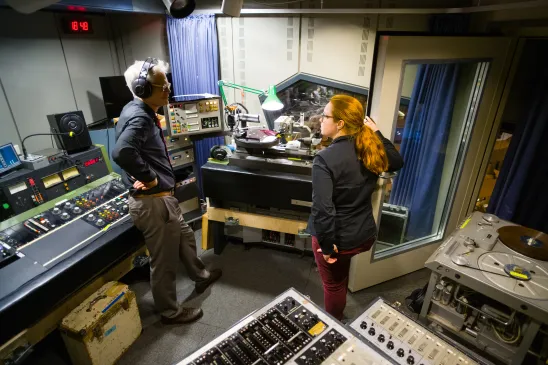 Rainer Maillard and Sidney C. Meyer at Emil Berliner Studios
Rainer Maillard and Sidney C. Meyer at Emil Berliner Studios
A quick recap on the Original Source Series, for those of you unfamiliar with these AAA reissues. These records were all produced by going back to the original 4-track master tapes, two tracks of which were dedicated to capturing ambient room information for a possible surround sound, quadrophonic release that never happened. The master tapes were played back on a specially modified tape deck, going through a custom modified mixer that allowed Rainer Maillard to adjust levels and balances “on the fly”. Sidney Claire Meyer cut the records directly from those masters (rather than from an intermediary mixed-down stereo master tape, as is customary). Working in close collaboration with the pressing plant, Optimal, Maillard and Meyer were also able to allow more sonic information into the grooves than was done when these records were first issued, transforming these recordings into sonic marvels.
(For those of you coming new to this Original Source Series craving more detail about how these remarkable records are produced, you might want to go back and read some of the coverage of the earlier reissues on this site, which goes into far greater detail about how these records were made: Batch #1; Batch #2; Batch #3 Part 1 and Part 2; plus the informative videos produced by DG - here and here; the video where I discuss the OSS series and the DG catalogue in general with fellow Tracking Angle scribe, Michael Johnson, can be found here).
As with the earlier releases, all records are issued on dead silent 180gram vinyl, with a black poly-lined inner sleeve. Covers are thicker than usual cardboard gatefolds (though not heavy Stoughton-style). Original sleeve notes are on the rear, and the gatefold shows extra photos of the artists and original session and mastering documentation, the latter also featured on a separate insert. Unlike the original DG releases, the sleeves have a matte rather than glossy finish, although that glossy finish magically reappears when the records are viewed through the Japanese-style outer, resealable plastic sleeves (with hype sticker), within which each release is presented. A lot of thought went into the presentation of these reissues, and it shows: it’s a smart package which acknowledges the archival origin of the records, while also giving them a fresh, up-to-date makeover.
Each release is a limited, numbered edition, and I fully expect these to sell out pretty quickly, as have previous batches. Thankfully, DG has recently repressed the first batch of four OSS titles. These represses are NOT numbered, but are available on the DG website, and should also become available on US retail sites like Elusive Disc and Acoustic Sounds (I believe they are up for pre-order now). Depending on how sales go, later titles from batches 2 and 3 that are also currently sold out and only available at mark-up prices from third-party sellers will, hopefully, also be repressed. As I have stated in my previous reviews, I believe all these reissues deserve to remain in print.
Time to dive in to the latest batch.
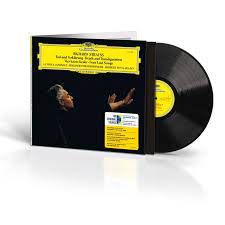
R. Strauss: Tod und Verklärung (Death and Transfiguration); Vier letzte Lieder (Four Last Songs)
Gundula Janowitz (soprano)
Berlin Philharmonic Orchestra conducted by Herbert von Karajan
Production: Dr. Hans Hirsch
Recording Supervision: Hans Weber
Recording Engineer: Günter Hermanns
Recorded Jesus-Christus-Kirche, Berlin on various dates, including 13th and 14th February, 1973 (Vier letzte Lieder)
Limited Edition of 3000
Music: 10
Sound: 10/9 (see below)
From the moment this new batch of OSS releases was first announced, I knew this was the record that I was going to spin first. This has long been one of my favorite recordings of anything, ever - a sentiment I (and many other music-lovers) share with a certain David Bowie, who included it in his list of 40 “desert island” discs.
“Like that certain book, this is one album that I give to friends and acquaintances continually. Although Eleanor Steber and Lisa della Casa do fine interpretations of this monumental work, Janowitz’s performance of Strauss’s Four Last Songs has been described, rightly, as transcendental. It aches with love for a life that is quietly fading. I know of no other piece of music, nor any performance, which moves me quite like this.”
David Bowie in Vanity Fair, 2003
Even in its previous incarnations on sonically compromised vinyl and CD, this was a performance of sheer wonder. How sonically compromised? Well, drop the needle on side 2 of this new OSS pressing - the Vier Letzte Lieder (or Four Last Songs) - and you will immediately hear what we’ve all been missing lo these many decades. I defy anyone popping this onto their turntable not to be mesmerized by the sheer beauty, power - and recorded fidelity - of soprano Gundula Janowitz’s singing of the demanding vocal line as it weaves in and out of the orchestral accompaniment, woven to silken perfection by the Berlin Philharmonic Orchestra under Karajan. I’m not sure I’ve heard anything quite like it - ever - on any record, it is that extraordinary.
Now I am sure there are many among you - both longtime classical fans, and newbies to this music - who will quietly (or loudly) admit to not being much of a fan of the typical classical soprano voice to be heard on a million recordings. I know what you mean. It is a sound that is hard to capture on tape and reproduce on home equipment without a certain brittleness and harshness (even distortion) creeping in. Well, this is the record to sweep away those reservations.
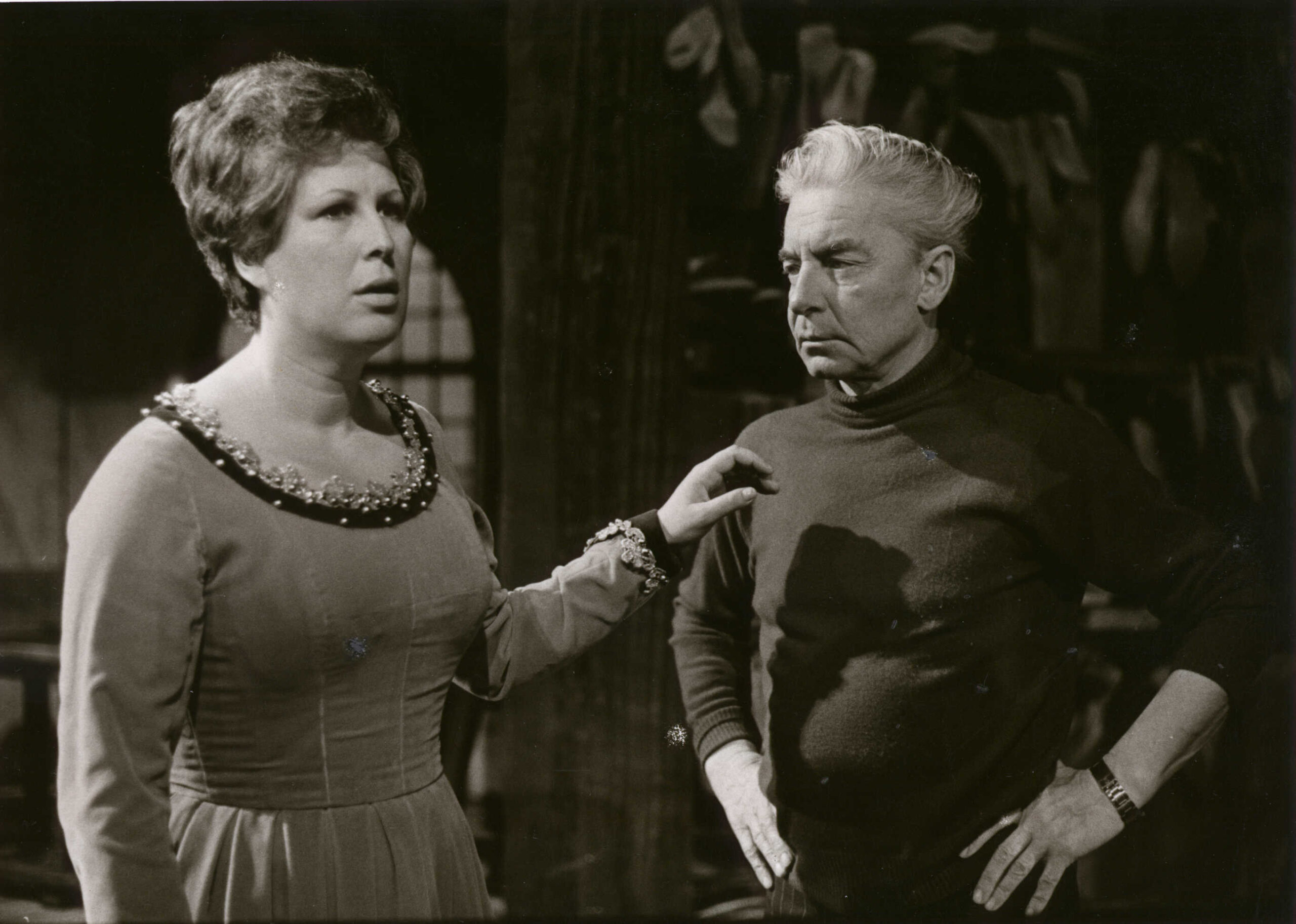 Janowitz and Karajan rehearsing Die Meistersinger von Nürnberg in 1975
Janowitz and Karajan rehearsing Die Meistersinger von Nürnberg in 1975
Karajan tended to favour singers whose voices had an almost instrumental quality, with beauty of tone overriding all other considerations. This did not always result in the best outcome for his choral and opera recordings, especially the later ones. But in Gundula Janowitz he found a voice that embodied these qualities to the nth degree, and he made full use of it in a number of classic recordings - including this one. Besides, the writing for voice in these songs treats it almost like an instrument in and of itself, so it’s a perfect match for Karajan’s sensibilities. Yes, the texts by Heinrich Hesse and Joseph Eichenforff are beautiful and poignant, but you really do not need to follow along or be familiar with them to enjoy this ravishing music.
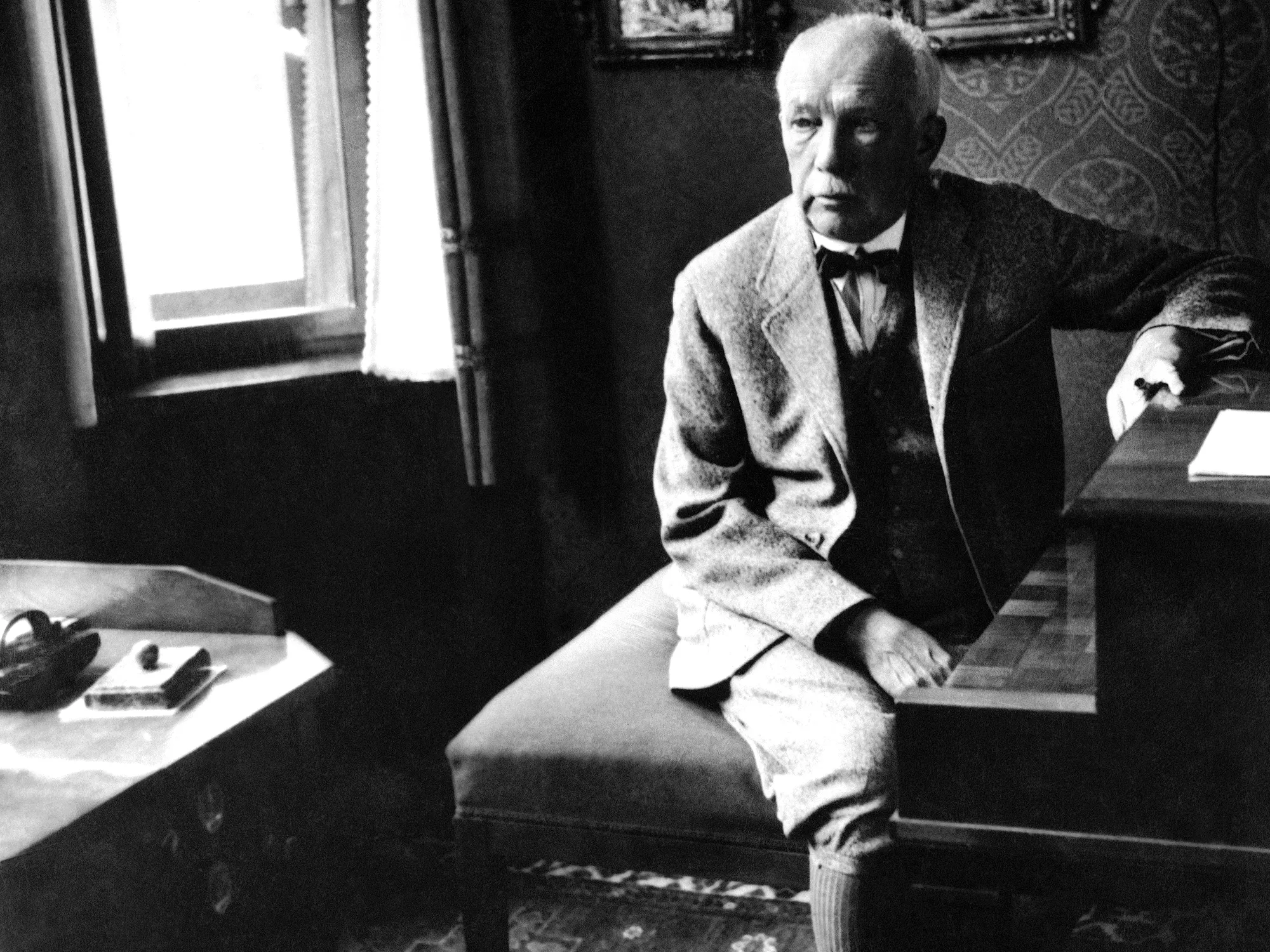 Richard Strauss
Richard Strauss
The Four Last Songs were not originally written as a cycle, merely as four separate works for soprano and orchestra. Nor were they given that title by the composer, even though he died in 1949, at the age of 85, within a year of composing the last of them. But they were indeed songs of farewell: to the world, and to the kind of life and society that the composer felt had been finally and irrevocably swept away by the horrors of World War II.
But the octogenarian Richard Strauss was saying farewell to life in music of almost unbearable poignancy and beauty. This was the sunset of Romanticism in music, composed at a time when the modernity of Stravinsky and the New Viennese School, and their followers, had already upended classical music. The late-Romantic idiom - lush and chromatic - which Strauss had pushed to the limit, here must have sounded to contemporary listeners like something of an anomaly, but a glorious one. There is indeed a sense of Strauss writing a farewell not only to life but also to music as he had known it. (There is a certain irony here, since his own opera Elektra (1909) had played an integral role in upending conventional diatonic musical language decades earlier).
As I was researching this review, I came across an excellent program note written by Herbert Glass for the LA Phil. A columnist for the Los Angeles Times, Glass was also a frequent annotator and editor for the Salzburg Music Festival, and he offered some thoughts on the songs that are worth quoting:
“Allow me a few personal favorite moments from among the gentle marvels Strauss created here: the sinuous vocal phrases, framed by clarinets and oboes, depicting the rain soaking into the receptive earth (“Kühl sinkt in die Blumen der Regen”) in “September”; the ecstatic violin solo, representing the soul’s flight, that separates the second and third verses of “Beim Schlafengehen”; the trilling flutes, representing a loving pair of larks, in “Im Abendrot”; and in the same song, the last in the group, the soprano’s final line, “Ist dies etwas der Tod?” (Can this perhaps be death?), followed by a whispered orchestral quotation from the composer’s early tone poem “Death and Transfiguration”, traditionally regarded as the last notes Strauss set down on paper.”
In these songs the soprano line weaves and soars like some otherworldly nightingale. The soloist must be able to effortlessly reach into the very top of her range, sometimes entering on a seemingly impossible high note at a piano, even pianissimo level. Janowitz makes this seem like the easiest thing in the world to do. It isn’t.
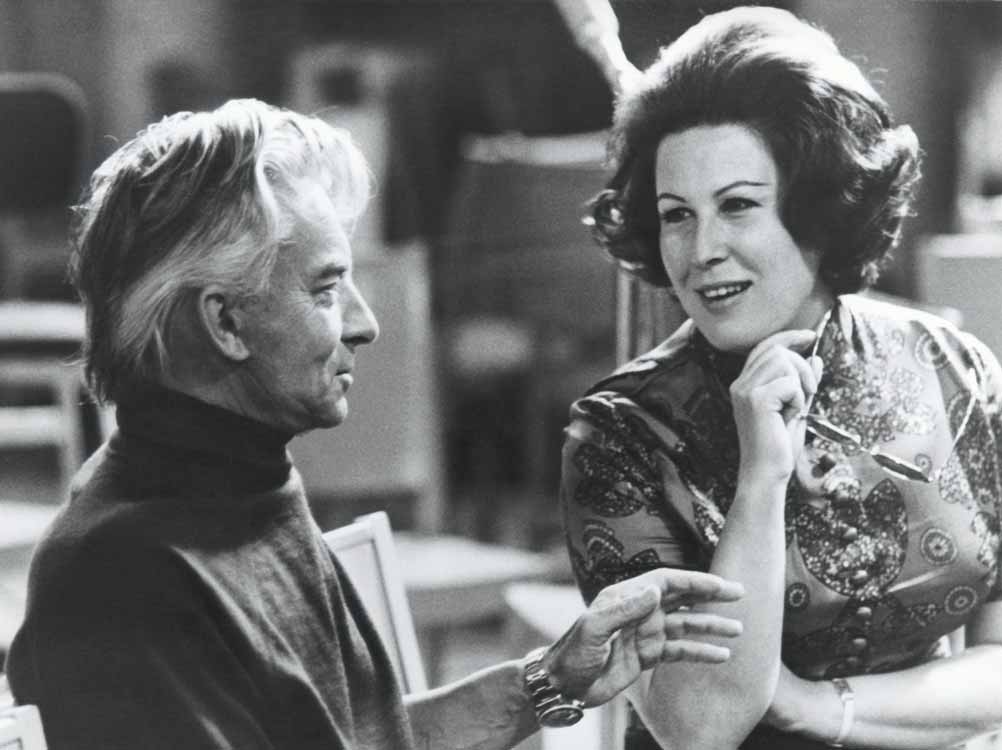 Karajan and Janowitz (Photo by Siegfried Lauterwasser)
Karajan and Janowitz (Photo by Siegfried Lauterwasser)
Even more remarkable, when you know it, is the fact that three of these songs were recorded in a single take, and the fourth with only one edit. In his biography of Karajan (an essential read for anyone wanting to understand not only what a conductor actually does, but also the history of the classical record industry, within which Karajan was probably the major player), Richard Osborne describes the circumstances of the sessions:
“The celebrated recording of Strauss’s “Four Last Songs”, with Gundula Janowitz, was certainly half improvised. Such rehearsal as there was became, in Karajan’s hands, a kind of courtly charade: he the deferential squire, Janowitz the free-spirited maiden who finally yields to the squire’s charms. The game-playing over, the songs were recorded, in complete takes, in two sessions. Only “Beim Schlafengehen” was redone, at the request of the orchestra leader, Michel Schwalbé.”
On one of the earlier OSS releases - the Verdi Requiem, also conducted by Karajan - for me the revelatory aspect of the recording brought into sharpest focus by the remixing and remastering of Rainer Maillard and Sidney Meyer was the sound of the soloists’ voices. They were massive, filling the aural space in a manner I have only ever heard in live performances. There seemed to be infinite headroom around their voices, with no sense of any sonic or acoustical constriction. This is not something you encounter often, if ever, on recordings you listen to at home. So when I heard this Strauss record was getting the OSS treatment, I was anticipating something very special indeed.
Well, I wasn’t disappointed - and neither will you be. Just as on that recording, you will hear Janowitz’s voice seemingly unmediated by technology. And it is a thing of wonder.
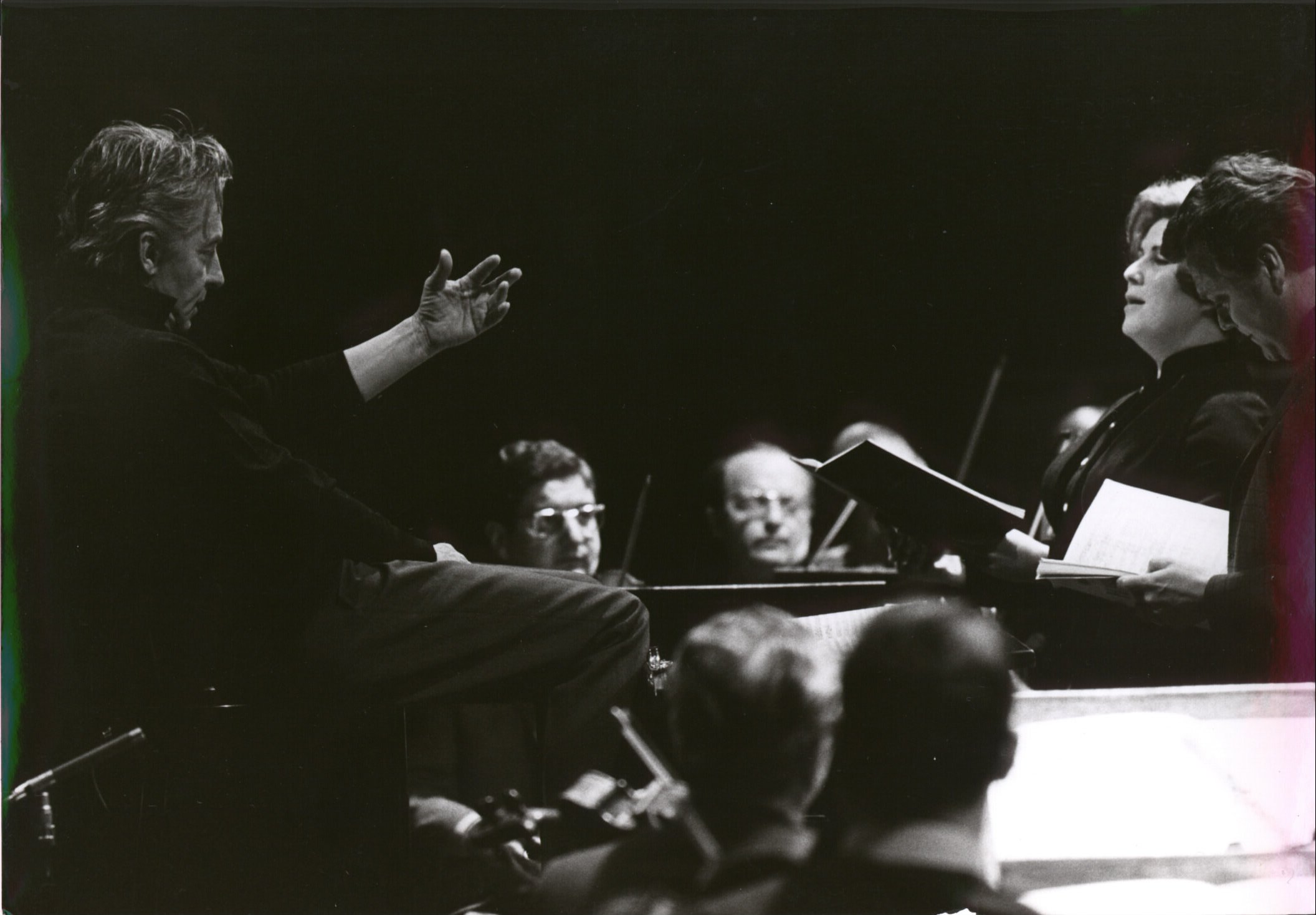 Janowitz and Karajan recording Die Schöpfung/The Creation (Haydn), 1969
Janowitz and Karajan recording Die Schöpfung/The Creation (Haydn), 1969
After that, I anticipated listening to side one - the early tone poem referred to above, Tod und Verklärung (Death and Transfiguration) - being if not a disappointment, well, maybe not quite as otherworldly as the Four Last Songs. It had been quite some time since I had listened to this version (Karajan recorded the work for Decca with the Vienna Philharmonic in 1961, and a second time with the Berliners in 1983). Well, in this new reissue I was transfixed from the very first notes, a musical depiction of the Artist’s failing heartbeat as he lies on his death bed. The music steals in pianissimo, and the sense of foreboding and fear is tangible. Karajan was one of the great Straussians, and as ever he is as surefooted a guide as any through the music’s progression from fear to raging at the dying of the light, from becoming lost in the innocence of childhood memories to acceptance, and finally the glorious transfiguration that ends the work. It is amazing to think that the composer wrote this when he was only 25.
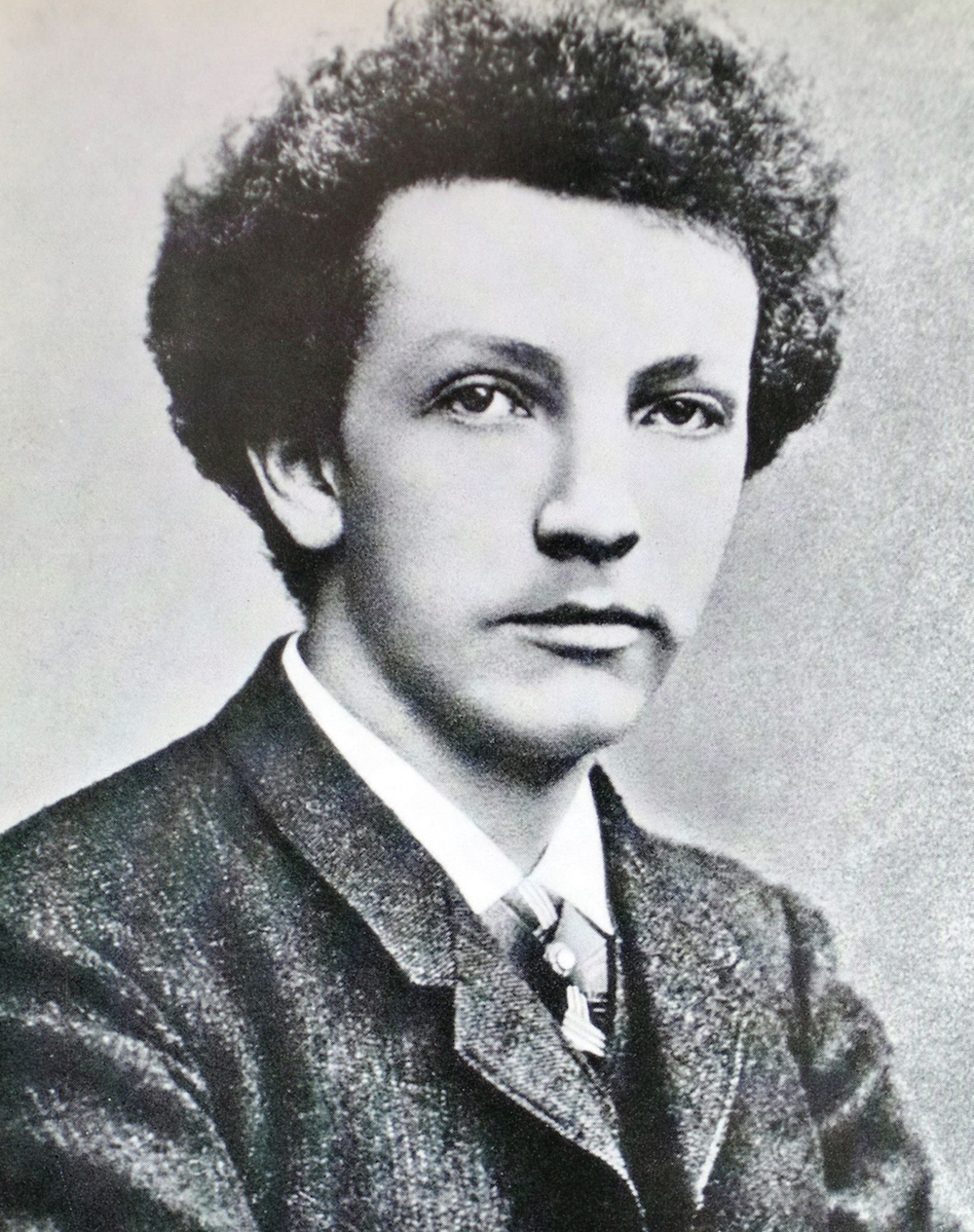 Richard Strauss as a Young Man
Richard Strauss as a Young Man
However, there is one small caveat to be made about the sound of this record, and it is something I have mentioned in connection with other recordings made in the Jesus-Christus-Kirche that have featured in this series.
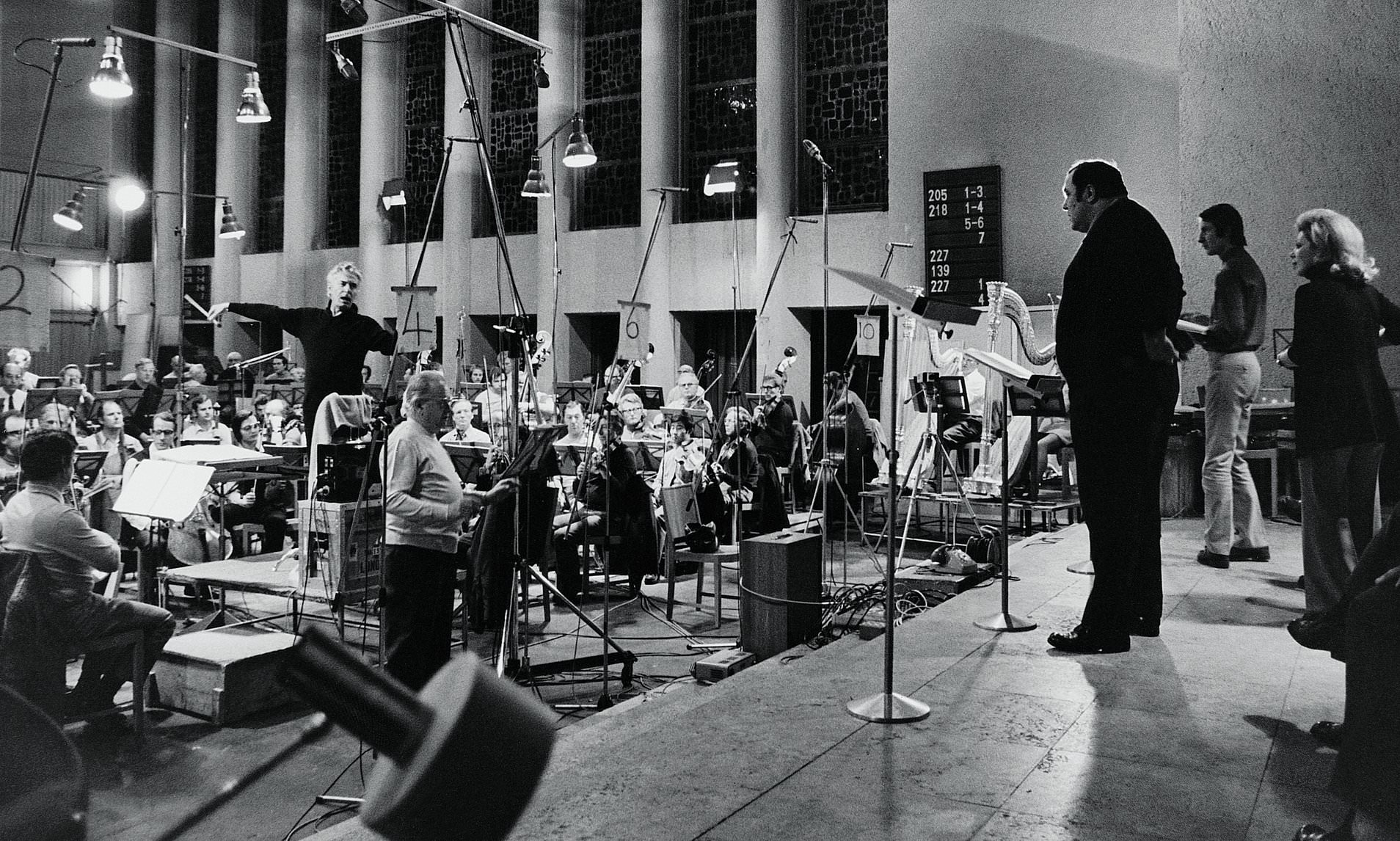 Karajan (l.) and Luciano Pavarotti (r.) recording La Bohème in Jesus-Christus-Kirche, Berlin in 1973
Karajan (l.) and Luciano Pavarotti (r.) recording La Bohème in Jesus-Christus-Kirche, Berlin in 1973
There is a certain recessed quality to the sound, and while bass isn’t entirely lacking (and much improved in the OSS remixing/remastering), it is still not as fully present as it might be. As with Karajan’s Mahler Symphony No. 5, one of the first releases in the Original Source Series, there is an occasional sense of recording perspectives changing, depending on what is going on in the music. Was this intentionally done, or was it merely a by-product of how the orchestral sound interacted with the building’s acoustics at different volumes? Impossible to say unless you were there at the original sessions. Certainly the remixing done by Rainer Maillard has vastly improved what we hear, but he can only do so much given the sound that must have been captured during the sessions, and the Jesus-Christus-Kirche as a recording venue, despite many positives, also had its drawbacks (including being bass-shy). This is why in my Sound Rating you will see two numbers: the first (a 10) representing the refurbished sound of this reissue, the second (a 9) representing my sense of the original recording quality on the master tape. Let me emphasize that my slight caveat refers only to the orchestral sound. The recorded quality of Gundula Janowitz’s voice is striking in its verisimilitude. This, combined with the benchmark excellence of the interpretation by her, the orchestra and conductor, of all the music on this record, makes this reissue an essential purchase.
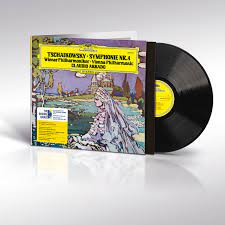 Tchaikovsky: Symphony No 4 in F minor, op. 36
Tchaikovsky: Symphony No 4 in F minor, op. 36
Vienna Philharmonic Orchestra conducted by Claudio Abbado
Production and Recording Supervision: Rainer Brock
Recording Engineer: Günter Hermanns
Recorded 12th and 13th August, 1975 in the Grosses Musikverein-Saal
Limited Edition of 2800
Music: 10
Sound: 10
There are no such sonic issues with this fine recording made with the Vienna Philharmonic in their main concert hall, the Grosses Saal in the Musikverein (from which the annual New Year’s Day Concert is broadcast worldwide).
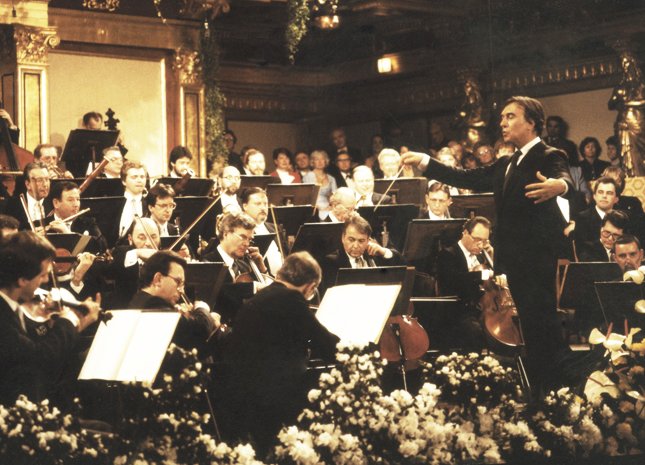 Abbado conducting the New Year's Day Concert in Musikverein, Vienna
Abbado conducting the New Year's Day Concert in Musikverein, Vienna
This recording was made around the same time in the same hall and with the same orchestra as the fabled recording of Beethoven’s 7th Symphony conducted by Carlos Kleiber, given an exemplary release in the first batch of the Original Source Series. As with that record, here the orchestra is far better integrated into the hall acoustic, and with the addition of the surround tracks from the original master tape, everything gains in tonal richness, with huge dynamics and a sense of infinite headroom to the recording. This sounds terrific.
Put on the original LP (as I did) and you’ll be hard pressed to believe both are cut from the same master tape. This is amongst the finest sounding (if not THE finest) Tchaikovsky 4ths I can recall.
As to the performance, it’s right up there. When it comes to the last three symphonies, which are the most frequently performed and recorded, everyone really should have the classic 1960 records made by the Leningrad Philharmonic in London under their legendary conductor Yevgeny Mravinsky. While the orchestra was on tour, Deutsche Grammophon was able to set up the sessions with British engineers, and thereby capture in excellent sound (that far surpassed anything the state-controlled Melodiya label could achieve) the distinctive timbre of the greatest of all Russian orchestras in their prime.
I must confess that ever since I started buying some of the EMI/Melodiya records as a kid, I have been a sucker for hearing Russian orchestras doing Russian music. I just love that sharp-edged, glinty timbre that is utterly unique to them, with strings that can get downright scratchy, braying brass and slightly sour woodwind. This is, in fact, one of the greatest joys in hunting down older classical records from the 1950s through the 1970s: listening to just how different orchestras from different countries and eras could still sound from one another (all differences that are largely gone today). You haven’t really heard French orchestral music until you’ve heard it conducted by André Cluytens (on EMI) and Ernest Ansermet (on Decca) with assorted French orchestras, and you certainly haven’t heard Russian music until you’ve heard Mravinsky, Svetlanov, Rozhdestvensky et al with their assorted Soviet orchestras on Melodiya.
Anyway, Mravinsky’s DG recording of Tchaikovsky’s 4th is in a class of its own. I mean, has anyone - anyone! - ever managed to play that last movement as fast and have every note in those string lines be so clearly articulated? I think not. I remember when I first heard these recordings, issued as part of a box set in DG’s Symphony Edition in the 1970s, I was gobsmacked. Original large tulip pressings of these Mravinsky records will cost you a pretty penny, but there was an excellent all-analogue vinyl box a few years back engineered by Emil Berliner Studios; it first appeared on Analogphonic, and then on DG. (Speaker’s Corner also did a fine one-off release of the 5th Symphony). How I wish DG would supplement their OSS releases with represses of these excellent vinyl editions of earlier classic recordings which are now very hard to find.
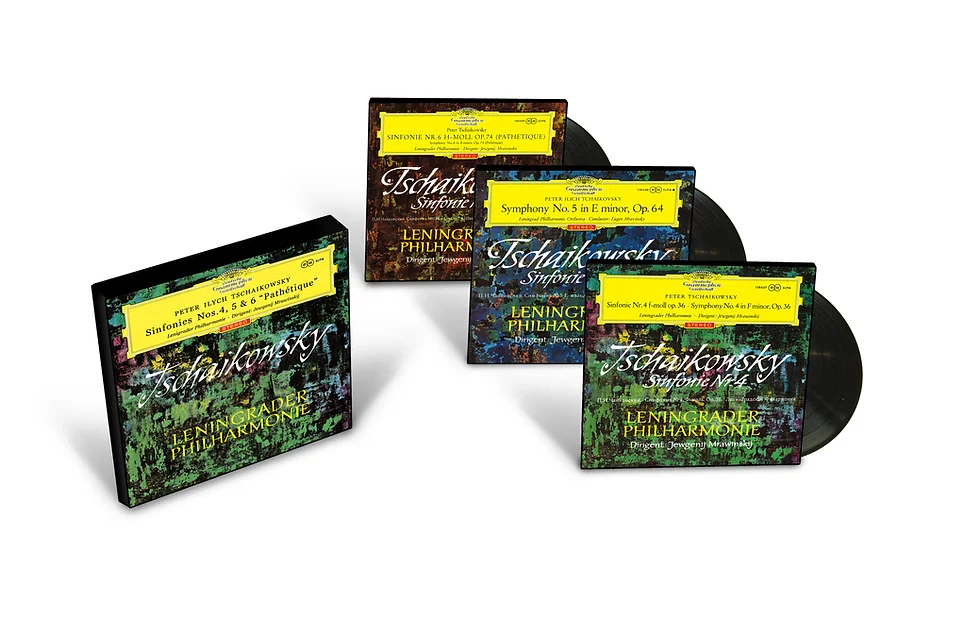 Analogphonic/DG reissue of Mravinsky Tchaikovsky Symphonies 4, 5, and 6 with the Leningrad Philharmonic
Analogphonic/DG reissue of Mravinsky Tchaikovsky Symphonies 4, 5, and 6 with the Leningrad Philharmonic
As to the work itself, I must say I have heard it so often that it is not one of those pieces I reach for very often, and I was somewhat dreading having to listen to it again. Don’t get me wrong: I adore Tchaikovsky’s music, and I think he still doesn’t get the critical respect he is due for his seemingly endless reserves of melodic invention and his superb powers of orchestration. It is, alas, one of those all too common cases in classical music where a composer who dares to be popular with the general public must in some way be considered lacking in sophistication and originality compared to his less popular brethren.
But then, before listening to this Abbado rendition, I happened to be in Cincinnati a couple of months ago, and went to a concert given by that city’s orchestra, which enjoys an excellent reputation, albeit on the second tier of American orchestras (though it enjoyed phenomenal recording success with its series of “Pops” records with Erich Kunzel on Telarc in the early days of digital). Anyway, guess what was on the program!
Well, what a surprise that turned out to be. The conductor, a certain Ramón Tebar - whom I’d never heard of - injected a distinct Slavic flavor into the proceedings, and the orchestra played the work with a freshness which was utterly engaging. The brass had a field day with their assorted fanfares and detonations, while the woodwind had a delicious sweetness in the slow movement.
Which brings me to Abbado. By comparison he and the orchestra play the work pretty straight, definitely within the central European tradition, but they play the hell out of it. How fabulous to hear those VPO brass and woodwind in all their distinctive sonorities (derived from playing instruments of a somewhat different design and sonic character that are handed down from generation to generation of orchestra members).
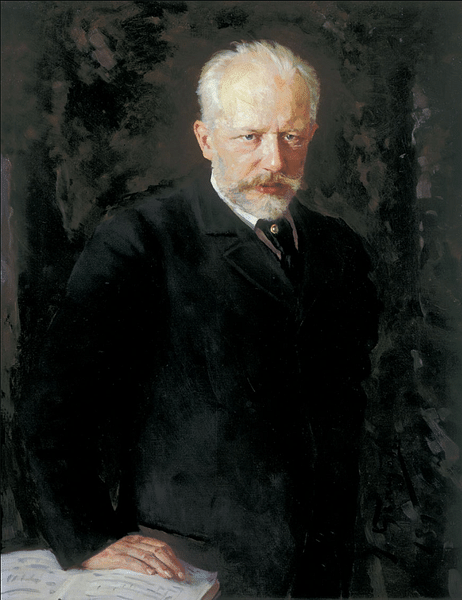 Tchaikovsky as painted by Nicolai Kuznetsov in 1893, the year of the composer's death
Tchaikovsky as painted by Nicolai Kuznetsov in 1893, the year of the composer's death
This symphony, famously, incorporates something of a programmatic element, in which the composer grapples with his destiny. The work opens with a spectacular brass fanfare - the so-called “Fate” motif - and the rest of the symphony is essentially a musical depiction of the composer trying to get around it, to surmount that domineering, oppressive melody that holds him hostage. In the frenzy and climax of the final movement you think he may have finally triumphed, only to have that “Fate” motif re-announce itself and put him back in his place. The final coda, for all its assertiveness, feels like a victory that may not last too long.
As the sleeve notes for this Abbado recording note, Tchaikovsky himself said of this musical motif that dominated the symphony: “This is Fate, that ominous power of destiny which hinders our striving after happiness, preventing us from attaining our goal and jealously ensuring…. that the heavens above us are not cloudless - a power like a sword of Damocles constantly poised above our heads and poisoning our spirits.”
The composer had recently extricated himself from a disastrous marriage to a former pupil, and the symphony reflected how close he came to not surviving the emotional stress of being a homosexual trapped in a loveless liaison.
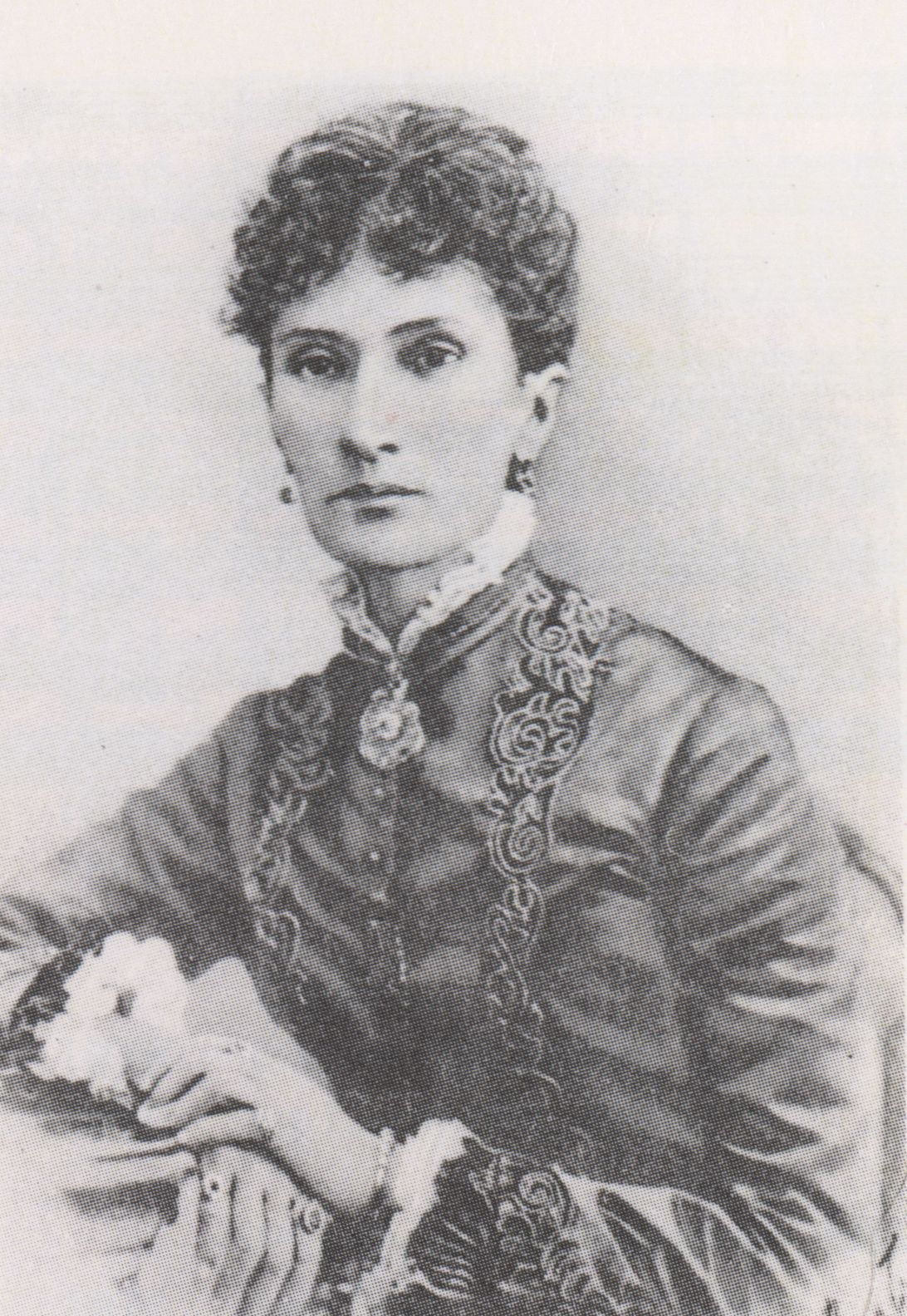 Nadezhda von Meck, Tchaikovsky's patron and confidante
Nadezhda von Meck, Tchaikovsky's patron and confidante
That he survived at all was largely due to the constant moral and financial support he derived from his patroness Nadezhda von Meck, whom he never met, but whose voluminous correspondence offers precious insights into his mental state over their 13 year relationship. “Without you I could never have written this Symphony,” he declared. He dedicated the work to her.
For me the third movement, a scherzo for plucked (pizzicato) strings and chattering woodwind that offers an essential interlude to all the stürm und drang of the surrounding music, is not only an utterly delicious musical bon bouche in and of itself, but also one of the most original symphonic movements ever written by anyone. Of course it comes up shining like a glittery diamond in this OSS remastering. Listening to really good recordings of pizzicato strings is one of the special pleasures of having a great sound system. (One of my favorite Decca records is English Music for Strings, with Benjamin Britten conducting the “Pizzicato Polka” from his own Simple Symphony; recorded in the excellent acoustics of the Snape Maltings concert hall; it’s the best string sound I’ve ever heard on LP).
Listening here to Abbado & co. toss this movement off so dazzlingly and insouciantly in the warm acoustics of the Musikverein is matched only by the orchestra’s leader, Willi Boskovsky, leading his colleagues in Josef and Johann Strauss Jnr.’s Pizzicato Polka on their famed 1979 New Year’s Day Concert, which just happened to be Decca’s first commercially released Digital recording.
In short, Abbado conducts this symphony better here than elsewhere (he later re-recorded the 4th Symphony as part of a complete Tchaikovsky cycle for Sony with the Chicago Symphony Orchestra). The Vienna Philharmonic is on top form. The sound on this Original Source remastering is superb: clear, detailed, forthright, with the orchestra placed within a natural-sounding acoustic.
Another “Original Source Series” keeper!
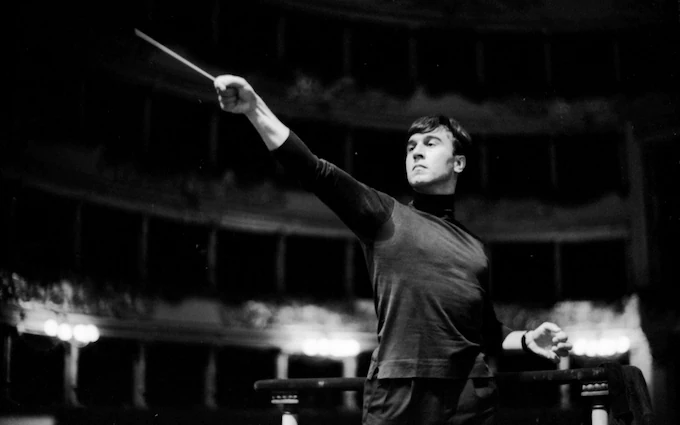 Claudio Abbado
Claudio Abbado


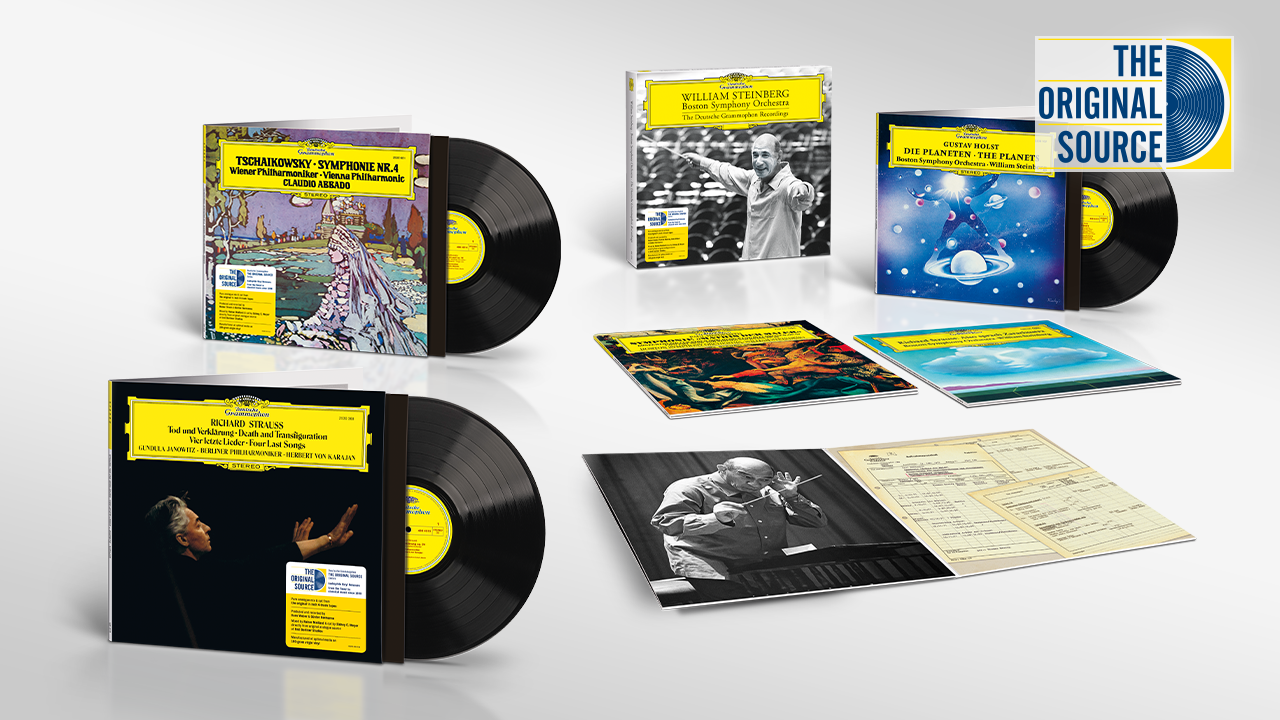





































.png)








